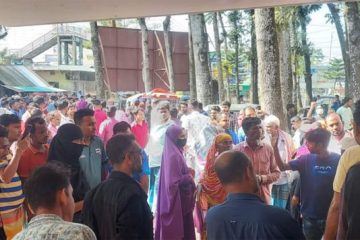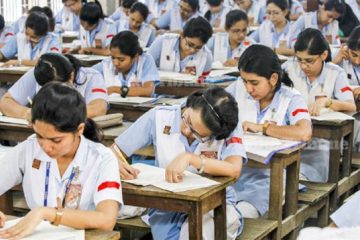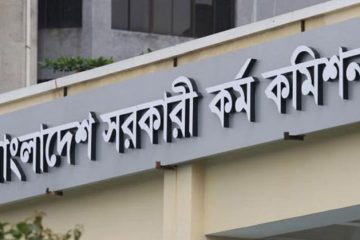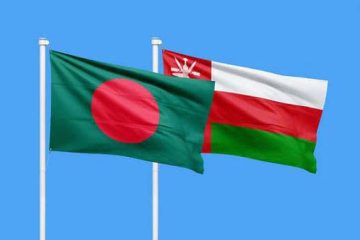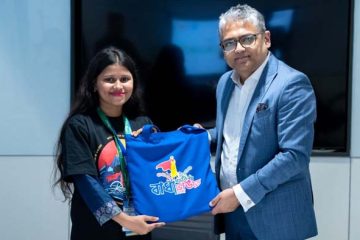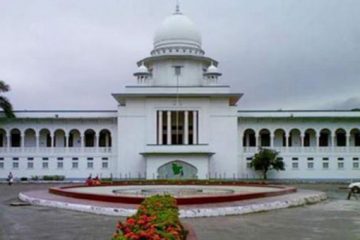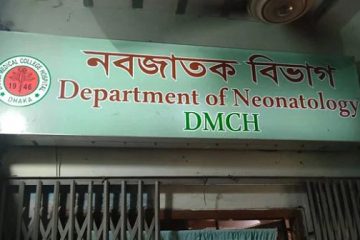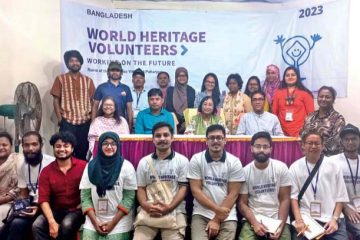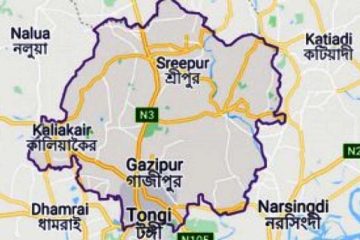by David Bergman
Tom Heinemann, the director of the documentary broadcast on Norwegian television which accused Muhammad Yunus of transferring aid money out of the Grameen Bank and using some of it to fund a telecom company, appears on the cusp of securing a big scalp.
There can be little doubt that without the broadcast of this documentary in November 2010—a revised version of which is about to be shown in Dhaka starting today—Yunus would be safe in his position as the managing director of the Grameen Bank, instead of now fighting to keep his job.
The film spawned the headline, ‘Yunus “siphoned Tk 7bn aid for poor”’, in the Bangladesh media.
It was this allegation that pushed the documentary from simply being a critique of microcredit to alleging corruption on the part of the Grameen Bank and Yunus himself. It provided the government with the perfect opportunity to make a move against Yunus. It was also this allegation – – vigorously denied by him and the micro lending body – that was used by the government to justify establishing a review of the Grameen Bank, with the Norwegian TV allegations as the first item in the inquiry team’s term of reference.
More recently, it was this allegation that was central to the claims of widespread criminal conduct on the part of the Grameen Bank and Yunus made in a widely circulated e-mail by Sheikh Hasina’s son’s Sajeeb Wazed that tried to justify the government’s action against Yunus.
‘Approximately US$100 million in donor funds to Grameen Bank were transferred out of Grameen Bank,’ Wazed alleged. ‘$70 million was never returned,’ he claimed. The explanation given by the Norwegian government inquiry ‘left millions of dollars unaccounted for,’ he added.
These comments are based directly on the documentary, or on a note put up on Norwegian Television’s website at the time the documentary was broadcast.
The journalists who worked with Heinemann certainly understand the significance of the film’s role in the removal of Yunus.
And they are full of pride at their achievement.
‘Gloating is not a dignified thing to do,’ writes Saifur Rahman, a key colleague of Heinemann, on his blog the day after the country’s central bank on 2 March 2011, started its attempt to remove Yunus from his position.
‘Today, and in this particular case, I make an exception … I hope today that grin has been wiped off [Yunus’s] face.’
On his Facebook page Rahman goes onto state, ‘I am privileged to have been part of this doc[umentary]. So thanks Tom, and I thank my team in Bangladesh for this great result.’
Heinemann himself also shows no sense of remorse. He states, ‘I’m the one who thank’s for all your dedicated help over more than two years.’ (sic)
Yet, despite the film’s incredible impact, there is no evidence to support the documentary’s central and killer allegations—that Yunus took donor money away from the Grameen Bank and used it for purposes other than those permitted by the donors.
In fact, the film’s very opening line—‘Muhammad Yunus used Norwegian aid money to start a mobile company together with Telenor in Bangladesh’—is not true.
Of course, the film deals with much more than just the use of donor money; it sets out a number of criticisms of microcredit generally. This article, however, only focuses on the allegations that became the headline news in Bangladesh and around the world and gave the government an excuse to try and bring Bangladesh’s Nobel laureate to his knees.
The film was broadcast at the end of November 2010, and on the very next day bdnews24.com published the article that did the Grameen Bank the damage.
The news agency’s story at first seemed credible. The misuse of fund allegation against Yunus and the Grameen Bank appeared to be based wholly on correspondence between the Grameen Bank and the Norwegian government which told its own compelling story.
However, the story was complex. And as it was such a big allegation, as editor, special reports for this newspaper, I thought that New Age should try and make its own judgements about it.
I, therefore, read all the documents which Tom Heinemann had made available, including getting those that were written in Norwegian translated into English.
I then read the Grameen Bank’s own response published a few days later, questioned its general manager M Shahjahan first over the phone many times, then through e-mails and then in person. I also made copies of relevant pages of the Grameen Bank’s annual reports.
Following this, I was in contact with Tom Heinemann himself and asked him for a response to some of the material that I had gathered.
Twelve days after the film was broadcast, and before the Grameen Bank instructed any lawyers to assist it, I wrote an article in New Age, titled ‘Norwegian film misunderstood Grameen financial transactions’ (see below for link).
My understanding of what actually happened is very different.
It is important to note that much of the story told in the NORAD correspondence is not in question.
There was in 1996 a financial arrangement which resulted in the ownership of Tk 3,474 million (NOK 608 million) of donor money being transferred to another company Grameen Kalyan. There was an agreement that the money was to be lent back to the Grameen Bank at an interest rate of about 2 per cent. It was a transfer that was done without the consent of all the donors, which included the Swedish International Development Agency, the Ford Foundation, and the German government aid agency GTZ.
It is correct that NORAD, one of the donors, was not happy when it found out about the arrangement and argued that the transaction raised principled concerns—particularly that the money would no longer be owned by Grameen shareholders and could, technically, be taken back by Grameen Kalyan at any time.
It is also part of the record that Yunus had tried to justify the arrangement to NORAD on the basis, amongst other things, that it was intended to reduce the Grameen Bank’s tax liabilities if tax exemption status was removed — but NORAD was not persuaded.
And it is true that, following pressure from NORAD, the ownership of Tk 754 million (NOK 170 million) was returned to the Grameen Bank – with the ownership of the remaining money staying with Grameen Kalyan.
So much so good.
Yet, Heinemann’s documentary went much further than that.
It went on to say that ‘money’ had disappeared from the Grameen Bank, that Yunus himself had ‘tapped’ the bank for the money. It then alleges specifically—apparently assuming that the money had physically moved out of the Grameen Account—that by the time the Norwegian government came to know about the transfer, ‘Grameen Kalyan had already transferred 50 mill NOK [Tk 243 million] of the aid money to build the mobile company Grameen Phone.’
It also claims that ‘438 million kroner [Tk 2,720 million] [of donor money]’ had ‘never [been] returned to Grameen Bank.’ The clear imputation here is that this donor money was used in a way not agreed by the donors.
Yet, not a single one of these allegations are true.
Neither the documentary, nor the material placed on NKR’s website, makes clear that the transfer was only ‘notional’; that whilst the ownership of this money changed, all the money stayed in the bank account of the Grameen Bank. That is to say the transfer did not result in any of the money moving out of the Grameen Bank’s bank account.
I have seen the voucher relating to this transaction, and it does not involve the physical transfer of money from one bank account of one company to the bank account of another company.
Understanding this is crucial to recognising that no money could ‘disappear’ from the bank account of the Grameen Bank or, as the bdnews24 story said, be ‘siphoned off’.
The money not only stayed exactly where it had been before the transactions (i.e. in the bank account of the Grameen Bank) it continued to be used in exactly the same way as it had before the notional transfer. There is, at least, no evidence that it was used for any other purpose.
So there can be no truth in the film’s assertion that ‘Grameen Kalyan had … transferred 50 mill NOK [Tk 243 million] of the aid money to build the mobile company Grameen Phone,’ as no aid money was in fact in Grameen Kalyan’s bank account! (Here a NORAD letter relied upon by the documentary makers was incorrect).
The only money (connected with the Grameen Bank) that was physically within Grameen Kalyan’s account was a small portion of the money that the Grameen Bank had internally generated from the interest that borrowers had paid back. This money—which was not donors money—was put into a fund called the social advancement fund (set up at the request of the donors) which was to be used for the welfare of borrowers and staff of the Grameen Bank.
It was some of this money that was invested in Grameen Telecom — not donor money as alleged.
Yet, key people supporting the government’s general attack on Yunus continue to assert that donor money had physically moved out of the Grameen Bank.
The Norwegian documentary mistakes continue.
It alleges that ‘438 million kroner’ [Tk 2,720 million] of donor money ‘was never returned to the Grameen Bank.’
Well, first of all, there was no actual money to return to the Grameen Bank’s bank account. And secondly, the ownership of the money—assuming that this is what the documentary makers were referring to—was, in fact, returned in 2003. This is clear from the Grameen Bank’s 2003 annual report.
A big question, however, is why the documentary makers made so many critical errors. There seem to be two factors involved.
First, it appears, they assumed, mistakenly, that the documents to which they had access told the full story, were correct in every detail, and needed no further clarification before broadcasting the film. This was an assumption they should not have made.
Secondly, prior to the film’s broadcast, the filmmaker never elicited a proper explanation about the nature of the transaction from the Grameen Bank.
Since the film was broadcast, Tom Heinemann has criticised the failure of the Grameen Bank to engage with the filmmakers and give them the bank’s side of the story. Whilst certainly there was no obligation on Yunus to agree to be interviewed, it was difficult to understand why the Grameen Bank had not given its side of the story to the programme makers.
Last week, I asked the Grameen Bank to show me the e-mails that Heinemann had sent them.
On looking at these, the reason for the Grameen Bank’s failure to explain its position becomes somewhat clearer: they were not told what were the allegations that the programme intended to make against them.
In none of these e-mails does Heinemann set out the allegations that he made in the film and ask the Grameen Bank for a response. The most substantive e-mail sent by Heinemann on this subject states that he was ‘in possession of some confidential documents from 1997/1998 regarding your transfer of 608.5 million NOK from Grameen Bank to Grameen Kalyan.’
The e-mail goes on to say that ‘The documents also tells, that some sort of agreement was made between Grameen Bank and Norad/The embassy, but unfortunately I do not know how much money Grameen Kalyan transferred back to Grameen Bank.’
He does say that he would ‘very much like to hear opinion on these issues’ (sic).
This is pretty vague. From this, there was no reason why the Grameen Bank would assume that the film was going to make allegations of misuse of funds.
Heinemann then goes on to ask two specific questions. ‘As I understand the documents you transferred the money in order to e.g. avoid taxation. Is that correct? On April 1. 1998 you also wrote a personal letter to Tove Strand from Norad. Here you ask for a meeting with her. Did you had that particular meeting and — if so — what was the outcome of it?’
Only the first question makes an allegation — but it is a small one in the context of all the other claims that the programme makes.
From this e-mail—and all the others it received—the Grameen Bank would have had no idea that the programme makers were going to allege that money had been transferred out of the bank account of the Grameen Bank, used to fund a profit-making enterprise, and most of it, to this day, not returned to the Grameen Bank.
On Friday, I asked both Tom Heinemann and Snorre Tonset, an editor at NRK, the Norwegian Television station, who was responsible for the film to respond to the points in this article. Neither has responded.
In a much earlier e-mail exchange at the time of writing my December 12 New Age article, Heinemann replied. ‘Donors had not intended the money to be transferred. There were massive implications of that transfer which is why money was demanded back. The compromise meant that Grameen Kalyan kept it. This was not how the donors had planned it. The telecom money was available as a result of the transactions, they carried out which was against donor agreements.’
Yes, agreed, donors had not intended the money to be transferred but that issue was resolved in 1997 with NORAD, and the other donors did not seem to mind that their money was transferred in this way. Yes, there may have been massive implications of that transfer—but only NORAD thought that they were important—and, significantly, none of those risks feared by NORAD actually came to pass in relation to the money that remained in the ownership of Grameen Kalyan for a further seven years.
Yes, it was not how the donors ‘planned’ it, but the matter was resolved 15 years ago.
On his last point about the telecom money, though, he was wrong. The telecom money has nothing to do with the transactions, and involves an entirely different pot of money — the social advancement fund.
He also added in this e-mail to me in December, ‘You seem not to be focussing on the fact that Grameen broke agreements. Why is that?’
There was a good reason for not doing that — though, of course, the article did refer to the broken agreements.
As Heinemann surely knows, it was not the breaking of the agreements (resolved 15 years ago) that was the story. It was the direct allegations implications that he and NRK made about how Grameen used the money. It was the sniff of corruption that catapulted this story throughout Bangladesh and into the international media.
And for making these particular allegations there is no reason for the filmmakers to gloat; they should rather hang their head in shame.
David Bergman is editor, special reports of New Age. He also happens to be married to a member of Muhammad Yunus’s legal team. The first New Age article referred to in this article can be accessed at http://unheardvoice.net/blog/2010/12/30/validity-of-charges-against-grameen-under-question/





